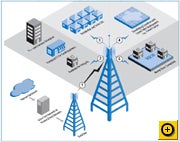"#14. Screwed up to the Max:
Municipal WiMaxIt sounded like a great idea: big cities would offer wide-area wireless Internet access as part of their infrastructure, the same as roads, traffic lights, and sewers. A cheap, fast Net connection anywhere within city limits, 24/7. What's not to love?
Then public and private WiMax ventures started dropping like flies. Sprint and Clearwire called off their plans to build a nationwide WiMax network, after Sprint CEO Gary "bet the company on WiMax" Forsee got canned last October. Earlier this year EarthLink bailed on its offer to foot the bill for a Wi-Fi network in San Francisco. Similar city-funded projects have bought the farm in Chicago; Milwaukee; and Anchorage, Alaska. Even Silicon Valley--arguably the most Net-centric community this side of Mars--has had a hard time getting its WiMax plans off the ground. The big reason? Cost. Unwiring the whole valley would cost an estimated $200 million, or $133K a square mile. SV geeks can always park their cars near the Googleplex in Mountain View, whose wireless network covers 12 square miles. As for the rest of us, well, we can hope and pray that the search titans win the FCC auction for the 700-MHz wireless spectrum next January, and then decide to open their network to the world. Does Google have to do everything?"
"#6. Un-Neutral: The Broadband Industry
Remember those halycon days when you paid $40 to $60 a month for "unlimited" broadband service and it actually was unlimited? Kiss those days goodbye. In 2007 we learned that some of the largest ISPs in the country--Comcast, Cox, Qwest, Cablevision, and Charter among them--throttle or otherwise interfere with BitTorrent traffic on the sly. Comcast denied it at first, then admitted to "traffic shaping" to discourage bandwidth-sucking peer-to-peer users. Now it's being sued by angry customers. Suddenly the whole Net Neutrality argument doesn't seem like such a bad idea.
Meanwhile, all the major telecom providers who blithely handed their bitstreams over to the NSA without a subpoena are now demanding retroactive immunity for the deed. Whose bits are they, anyway?"




No comments:
Post a Comment